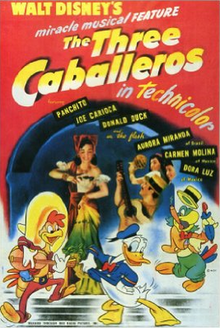| The Three Caballeros | |
|---|---|
 Theatrical release poster | |
| Directed by | Supervising Director:
Sequence Directors:
|
| Story by |
|
| Based on | |
| Produced by | Walt Disney Norman Ferguson |
| Starring | |
| Music by | |
Production company | |
| Distributed by | RKO Radio Pictures |
Release dates |
|
Running time | 71 minutes |
| Country | United States |
| Languages |
|
| Box office | $3.355 million (worldwide rentals)[2] |
The Three Caballeros is a 1944 American live-action and animated musical propaganda[3] anthology film produced by Walt Disney and released by RKO Radio Pictures. The film premiered in Mexico City on December 21, 1944. It was released in the United States on February 3, 1945 and in the United Kingdom in March 1945. It marks the tenth anniversary of Donald Duck and plots an adventure through parts of Latin America, combining live-action and animation. This is the second of the six package films released by Walt Disney Productions in the 1940s, following Saludos Amigos (1942). It is also notable for being one of the first feature-length films to incorporate traditional animation with live-action actors.[4]
The film is plotted as a series of self-contained segments, strung together by the device of Donald Duck opening birthday gifts from his Latin American friends. Several Latin American stars of the period appear, including singers Aurora Miranda (sister of Carmen Miranda) and Dora Luz, as well as singer and dancer Carmen Molina.
The film was produced as part of the studio's goodwill message for Latin America.[5] The film stars Donald Duck, who in the course of the film is joined by old friend José Carioca, the cigar-smoking parrot from Saludos Amigos, who represents Brazil, and later becomes friends with a pistol-packing rooster named Panchito Pistoles, who represents Mexico.
- ^ "The Three Caballeros: Detail View". American Film Institute. Retrieved April 27, 2014.
- ^ "Richard B. Jewell's RKO film grosses, 1929–51: The C. J. Trevlin Ledger: A comment". Historical Journal of Film, Radio and Television, Volume 14, Issue 1, 1994.
- ^ Cite error: The named reference
Smithsonian2019was invoked but never defined (see the help page). - ^ Gleiberman, Owen; Schwarzbaum, Lisacn (July 31, 2013). "5 Best – and 5 Worst – Live-Action/Animation Hybrid Movies". Entertainment Weekly. Retrieved January 19, 2022.
- ^ Disney, Walt. "An Interview with Walt Disney". Orson Welles Mercury Theater (Interview). Interviewed by Fletcher Markle.